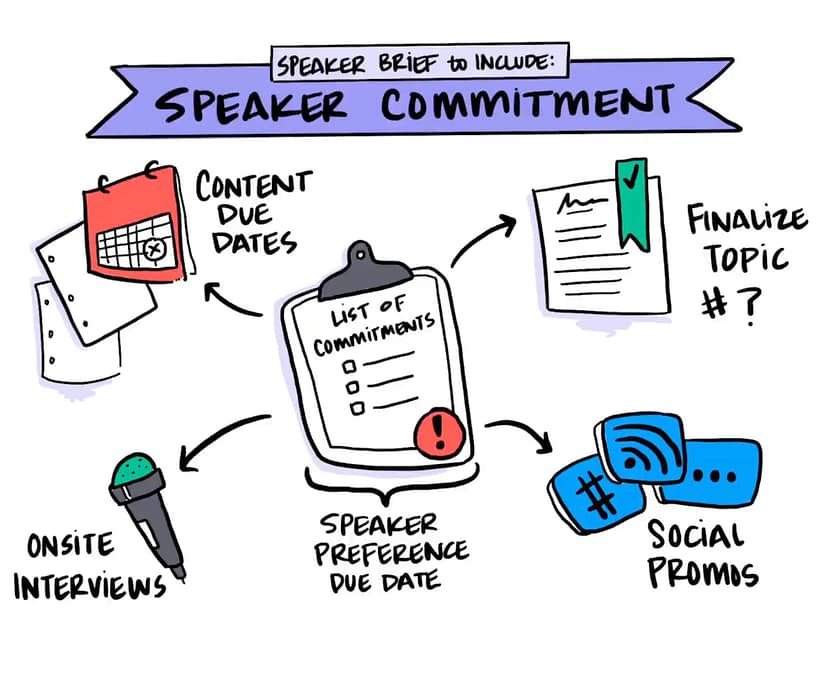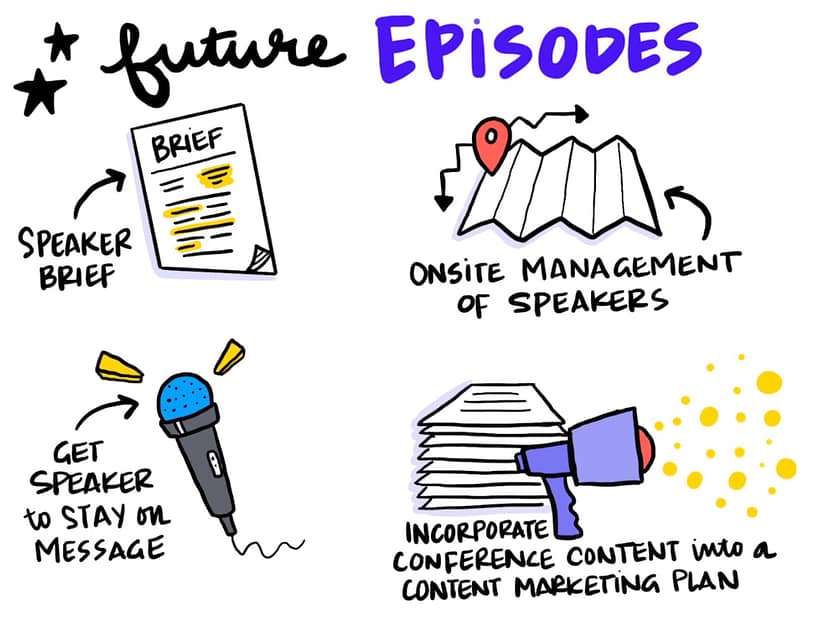6 Ways to Work with Remote Speakers for Virtual Event Success 6 Ways to Work with Remote Speakers for Virtual Event Success 6 Ways to Work with Remote Speakers for Virtual Event Success 6 Ways to Work with Remote Speakers for Virtual Event Success 6 Ways to Work with Remote Speakers for Virtual Event Success
text
The sudden shift to virtual events has created many challenges for planners – especially when it comes to managing remote speakers. In fact, the virtual event environment has made the whole process of speaker presentation and management more difficult, both in terms of providing value to attendees and meeting speaker expectations. But, just how difficult is speaker engagement when it comes to virtual events? And what can you do, to work effectively with your speakers?
Here we highlight six ways to help you. Let’s take a look.
1) Co-Create Speaker Content
Whilst speakers will develop their content for your virtual event, you need to see it as well. It could be that speakers are unaware of the subtle differences between delivering content at an in-person event to delivering content to your virtual attendees. The design of sessions is super important if you really going to engage your audience.
For example, attention spans are a lot shorter online, we experience screen fatigue – and of course, a speaker cannot ask delegates to do the ‘turn to your neighbor and discuss’ exercises.
Some speakers will be presenting for the first time and will welcome your help. Your co-creation could be as simple as requesting they reduce the number of slides. Go through their presentation if they have one and see how you can help make the content more interactive and more engaging.
Expectations of virtual delegates have been increasing rapidly since Covid-19 hit and it’s important that your speakers deliver content that makes a difference.

On-Demand Webinar: Virtual Events – 10 Ways to Keep Your Attendees Engaged!
2) Explain the Tech
Speakers should be asking you about the tech you will use. If they don’t, it may be a sign that they may not understand what happens at a virtual event. That in itself is a red flag and will indicate just how much virtual ‘hand holding’ you will need to do.
Let them know if they will be able to see your attendees. Some companies want speakers to see attendees, other companies don’t. In some instances, this may be decided for you by compliance protocols, in that, only certain tech platforms can be used.
All event tech platforms are different. Some are more advanced than others, some have better data security than others and some are more user friendly than others. It’s important that the speaker understands the platform. Does it allow for them to easily upload their content? Does it have the functionality for polling and questions already built in?
Related read: Choosing a virtual event platform – how to get it right!
You may be using an event tech stack that you have stitched together. That is fine as long as you know what it does and if there are any gaps. You cannot explain to a speaker what they can do with the tech, without a clear understanding of what the tech you are using will do. Some virtual event tech providers like Events force offer added support through partnerships with A/V companies that provide all the tech support that remote speakers need – from briefings and preparing presentations to testing and rehearsals, managing transmissions, studio hire, speaker green rooms and so on.
3) Emphasize the Importance of Time
Whilst at an in-person event, speakers may be able to stretch the timing. But that is not the case in the virtual world. Remember your virtual audience will be tuning in to see what they need as specified in your programme and they will expect you to be on time.
Letting time run away is a big mistake. You need to be in control of time, not be governed by it. After all you are making a production. Think of a TV show and you will understand why timing is critical. The News at 6.00pm comes on at 6.00pm and finishes on time every time. You need to deliver the same exacting attention to detail.
If speakers want to include questions and polling as part of their session let them know how much time is available for this. You need to allow time for the question to be read, for attendees to respond and then for the results to come in. Often polls are done really quickly which is a shame. Allowing sufficient time for polling will give you a greater return. At the #GMIDgoesvirtual event in April 2020 more than 7,000 delegates voted in a poll and the session still kept to time.
Just be clear with your speaker that the session ends according to the programme and not a second later.
4) Fully Brief your Speakers
Some speakers are getting used to the complexities of speaking in the virtual space. So the more that you can provide useful event speaker information to them, the better.
Essential to this is for you to re-iterate what you have agreed with them already. Make sure you cover all the basics as you would for an in-person event but also be super clear on audience participation activities that are or are not possible.
Let them know what discussion with attendees actually means. Will they speak and be heard or will they speak by way of submitting an online question or comment?
You may wish to provide some screen shots of the platform the speaker will be using to give them a quicker ease of familiarity. Let them know what to do in case they get cut off because their connection drops. Who do they call and what number do they dial? Remember, the event will be live so you need to seamlessly get them back on track without too much fuss.
It is up to you how much of a briefing you provide. But with virtual events, the golden rule is that you need to provide as much detail as you can. Put your speakers at ease because there is more complexity involved than at an in-person event.
5) Insist on Rehearsals
When working with remote speakers, make it clear that you will be carrying out a rehearsal(s) before you go live. And make it clear that a rehearsal is not negotiable – speakers need to be there. Virtual events demand more attention to detail and hence rehearsals play a vital role in the success of your event.
Your speakers, host, tech team and everyone else playing a role has to know what to do and when to do it. They also need to know what to do when things go wrong. And they will.
Go through the running order from top to bottom. Don’t make the fatal mistake of just talking through what will be happening. It’s not enough. You need to rehearse everything. Then you can work out where the challenges are. You can discover what is working well and what isn’t. This enables you to adjust to improve for the live production.
How do your speakers look on camera, where they are positioned and what background are they using, are just a few of the things that you need to check out. You can adjust sound, lighting and scripting at the rehearsal stage. But once you go live, you are live and you cannot start again.
Run the rehearsal fully, check all the slides, play the videos and take it seriously. You will get better results and greater engagement from your audience.
6) Maximize the Opportunity
Working with speakers is a two-way street. They want to share their knowledge, insights and experience. And you want all of that, because it is great content for your attendees. But rather than just have the speaker deliver their session and leave, there are other ways in which you could maximize the opportunity. After all, a lot of effort has gone into getting everything in place and working correctly so don’t let them go, just yet.
For example, their session has ended but you could do a Q&A with them immediately and use that later in your programme or as on-demand content a few months after the event.
Whilst you have the speaker, make the most of them. It will benefit both of you. And it means you can keep providing relevant and valuable content throughout the year to your community.
Conclusion – You Are the Programme Producer
Working effectively with your speakers means that your attendee engagement levels are likely to increase. This in turn should mean a stronger ROI and that would be a good result.
Getting the programme absolutely right takes skill and experience. You will be acutely aware that too much content is likely to lead to your delegates to look for escape routes of session changes, lunch and comfort breaks. However, too little content and you run the risk of them deciding there is not enough for them to take the time to participate.
It’s a fine balance that you need to deliver and that is where good design skills will help. This is why it’s critical that the speakers deliver precisely what you need. Directing your speakers may feel uncomfortable at first but it is necessary. After all, you are not stage managing an event, but creating a virtual production. Therefore, you need to take control as a producer and not as a planner. A number of speakers will be happy for you to direct them. If you both communicate clearly you will be well on the path to producing a very successful virtual event.




